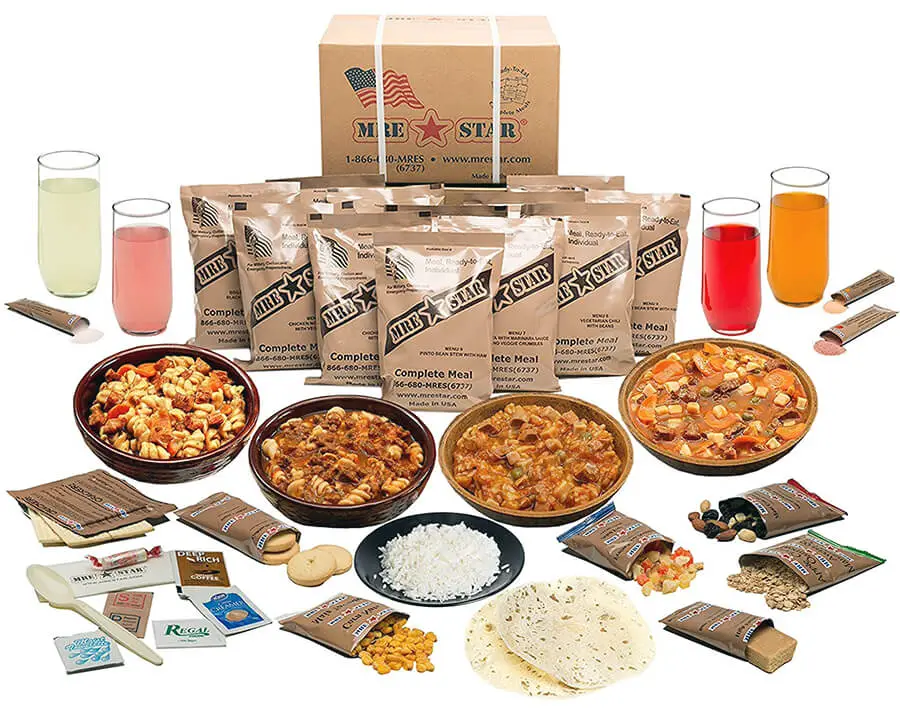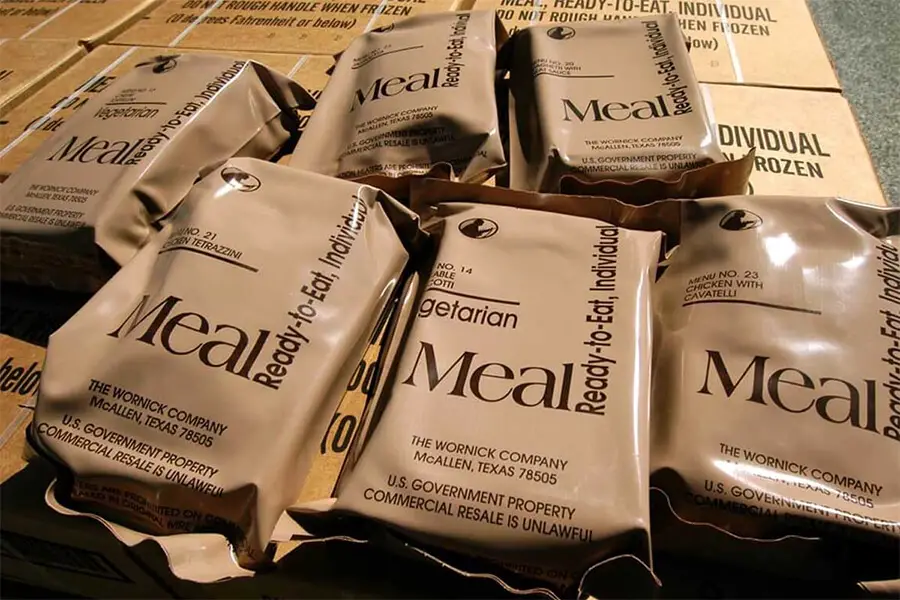MREs (or Meals Ready-to-Eat) are packaged meals that come in individual servings. They’re easy to store and don’t require cooking, which makes them ideal for emergency situations. An MRE usually contains everything you need to get through a meal, including an entree, side dish, dessert, crackers, spreads, and utensils.
MREs are an essential part of any survival kit. But how long are MREs good for? Can they last for several years? And what happens if you eat one that’s past its expiration date? Also, what is the best way to store and preserve them?
In this article, we will give precise answers to these and several other related questions.
A part of this article is summarized in the following video:
How Long Are MREs Good For?
According to military and survival experts, the life span of most MREs is up to 5 years. As long as they are stored in dry conditions and at 80°F / 26.7°C or less, they are good throughout this period of time.
To ensure that your MREs are always good, add a 6-month check to your routine. Every half a year, check your stored MREs’ expiration dates and rotate out those who are about to expire. You can consume them or dispose of them, just make sure you replace them with fresher MREs.
This way, your essential supplies will be always ready for any emergency or doomsday event.
What Are the Most Recommended MREs?
LoJo Surplus Genuine Military MRE
These military issue MREs are perfect for any emergency and long-term survival, but also for hiking and camping activities. Every meal is 1250 calories in average, which can be enough to sustain you for hours, or even a whole day.
Every vacuum-sealed package contains a meal (dozens of various dishes are available), side dish, bread or crackers, snack or dessert, powered beverage, basic seasonings, utensils, and napkin. There is chicken burrito bowl, beef stew, elbow macaroni, meatballs in marinara sauce, and many more to choose from! 10+ year shelf life guaranteed.
Click here to read more reviews and compare prices.
ReadyWise Emergency Food Supply
ReadyWise is the leading emergency food company. Their food is known for its variety, nutritious values, high quality, and tastiness. This particular survival kit contains 104 servings of 14 distinct types of meals. There is stroganoff, pasta alfredo, teriyaki rice, cheesy lasagna, cereals, fruits, and much more!
ReadyWise guarantees a long-lasting storage of up to 25 years! This is much longer than your regular MREs.
Click here to read more reviews and compare prices.
Can You Eat a 20 Year Old MRE?
While MREs were designed to be durable and long lasting, there is a limit to how long they will stay fresh. After the aforementioned five years, the quality of the food begins to decline, and it is no longer recommended to eat them.
However, there are some people who say that they have eaten 20-year-old MREs with no problems. While it is possible that the food inside these older MREs may not taste as good as it did when it was first made, it should still be safe to eat assuming the package has not been damaged and the food has been kept in a cool, dry place.
If you have old MREs that you want to use up, there are a few things you can do to make them more palatable. Adding hot sauce or salsa can help boost the flavor of bland meals. You can also try adding fresh fruits or vegetables to give the meal a fresher taste. Finally, heating up an MRE will often make it taste better than eating it cold straight from the package.
Can You Eat Expired MREs?
The short answer is yes, you can still eat expired MREs. However, there are a few things you should know before chowing down on those old rations.
First of all, expired MREs may not taste as good as fresh ones. The food inside an MRE pouch is vacuum sealed, which means that over time the flavors will start to dissipate. So, if you’re expecting gourmet meals when you open up your expired MRE, you’ll probably be disappointed.
Second, the nutritional value of an expired MRE will also start to decline over time. The vitamins and minerals inside the food will degrade and become less effective. Therefore, if you’re relying on an MRE for sustenance during tough times, it’s important to make sure that your ration is as fresh as possible.
Finally, while rare, it is possible for bacteria to grow inside an unopened package of an expired MRE. This can turn the meal into a poisonous hazard. If you have even the slightest doubt about MRE’s color, texture, or smell, immediately dispose of it and do not consume!
In conclusion, eat expired MREs only as the last resort. A better solution would be periodically checking the expiration dates and refreshing your stock.
Can You Get Sick From MRE?
MREs are shelf-stable meals that do not require refrigeration or freezing. They were originally developed for military personnel but are now available to civilians.
So, can you get sick from eating an MRE? The answer is no – as long as the meal is within its expiration date and has been stored properly (i.e., in a cool, dry place). MREs are safe to eat because they are vacuum-sealed, and they also undergo a process called irradiation, which kills bacteria and other microorganisms that could cause food poisoning.
However, if you have a specific food allergy or intolerance, you may want to check the ingredients list before consuming an MRE.
Of course, just because MREs are safe to eat doesn’t mean they’re necessarily appetizing. Some people find the taste and texture of MREs to be unappealing, and others may experience gastrointestinal discomfort after eating them. If you’re not used to eating high-fat or high-fiber foods, you may want to start with small portions of an MRE until your digestive system adjusts.

When Should You Throw Out MREs?
As stated earlier, MREs have a shelf life of about 5 years. However, it is important to note that this only applies to unopened MREs. Once an MRE is opened, its shelf life decreases significantly. An opened MRE will only last about 3 days before it starts to spoil. So, if you have an open package of MREs, make sure to eat them within 3 days. Otherwise, you can wrap them in a plastic bag and throw away.
Of course, there are other factors besides time that can affect the quality of your MREs. If you store your MREs in a hot environment (above 80 degrees Fahrenheit / 26.7 degrees Celsius), they will start to degrade more quickly. Similarly, if you store your MREs in humid conditions (over 60% relative humidity), they will also start to deteriorate more rapidly. Hence, if you live in a hot or humid climate, make sure to consume your MREs sooner rather than later!
Remember, it’s always better to err on the side of caution and consume your MRES while it’s still good – after all, they’re not going to do you any good sitting on the shelves past their expiration date.
Are Military MREs Healthy?
Military MREs are designed to provide enough calories and nutrients for one person for one day, and they must be able to withstand being transported and stored under less-than-ideal conditions. While MREs have come a long way since their inception during World War II, there is still some debate as to whether or not they are healthful.
The main concern with MREs is that they are high in sodium and fat. A typical MRE contains about 1,200 mg of sodium, which is more than half of the recommended daily intake for adults. Additionally, MREs tend to be high in saturated fats and trans fats, which can increase your risk of heart disease. However, it’s important to remember that soldiers often burn more calories than the average person, so these higher levels of fat and sodium may not have the same effect on them as on sedentary civilians.
Another concern with MREs is that they lack fresh fruits and vegetables. While most MREs do contain some dehydrated fruits and vegetables, these aren’t necessarily the same as fresh produce. Fruits and vegetables are an important part of a healthy diet because they provide essential vitamins, minerals, antioxidants, and fiber. If you’re eating an MRE every day, you might not be getting enough of these vital nutrients.
So what’s the verdict? Are military MREs healthy? The answer isn’t entirely clear cut. While there are some potential health concerns with eating MREs regularly, it’s also worth noting that soldiers who eat them don’t seem to suffer any ill effects from doing so. Ultimately, it’s up to each individual to decide whether or not an MRE fits into their personal definition of “healthy.”
The following video demonstrates how to eat an MRE in the field:
How To Properly Store MREs?
There are a few things that you can do to make sure your MREs last as long as possible:
- Store them in a cool, dry place. MREs are designed to withstand high temperatures, but storing them in a cool, dry place will help to prolong their shelf life.
- Avoid exposure to sunlight or extreme heat. While MREs can withstand high temperatures, exposure to sunlight or extreme heat can cause the food to degrade more quickly.
- Keep them away from moisture and water. Moisture and water can damage the packaging of an MRE and lead to spoilage of the food inside.
- Inspect your MREs regularly. Check for signs of damage or leaks in the packaging, and be sure to eat any foods that show signs of spoilage immediately.
How Do MREs Have Such a Long Shelf Life?
MREs have a long shelf life because they are packaged in airtight containers that prevent oxygen from getting inside. Oxygen is one of the main causes of food spoilage, so by keeping it out, MREs can last for years without going bad.
Another reason why MREs have such a long shelf life is because they are sterilized using irradiation. This process kills bacteria and other microorganisms that could cause the food to spoil. Irradiation also extends the shelf life of many other foods, such as dried fruits and vegetables.
Further Reading
So there you have it, a complete FAQ regarding MREs’ shelf life, their storage, consumption, and what to do once they expire.
I have several additional articles that you might find useful. If you’re wary about the government and martial law, my article on safest places to hide your survival supplies will teach you exactly where and how to conceal your MREs if you wish to keep them to yourself.
MREs are not the only item that you need for survival purposes. Please read the posts about what should be in a survival backpack, best first aid kits, and survival gadgets to stay more prepared for whatever may come your way.
And finally, to have more rounded survival knowledge, I recommend you check my list of best survival books. These books teach everything there is to know about survival: how to gather food and water, how to hunt and fish, how to build shelter, make fire, treat wounds, and much more!
Be safe and be prepared, my friends!



